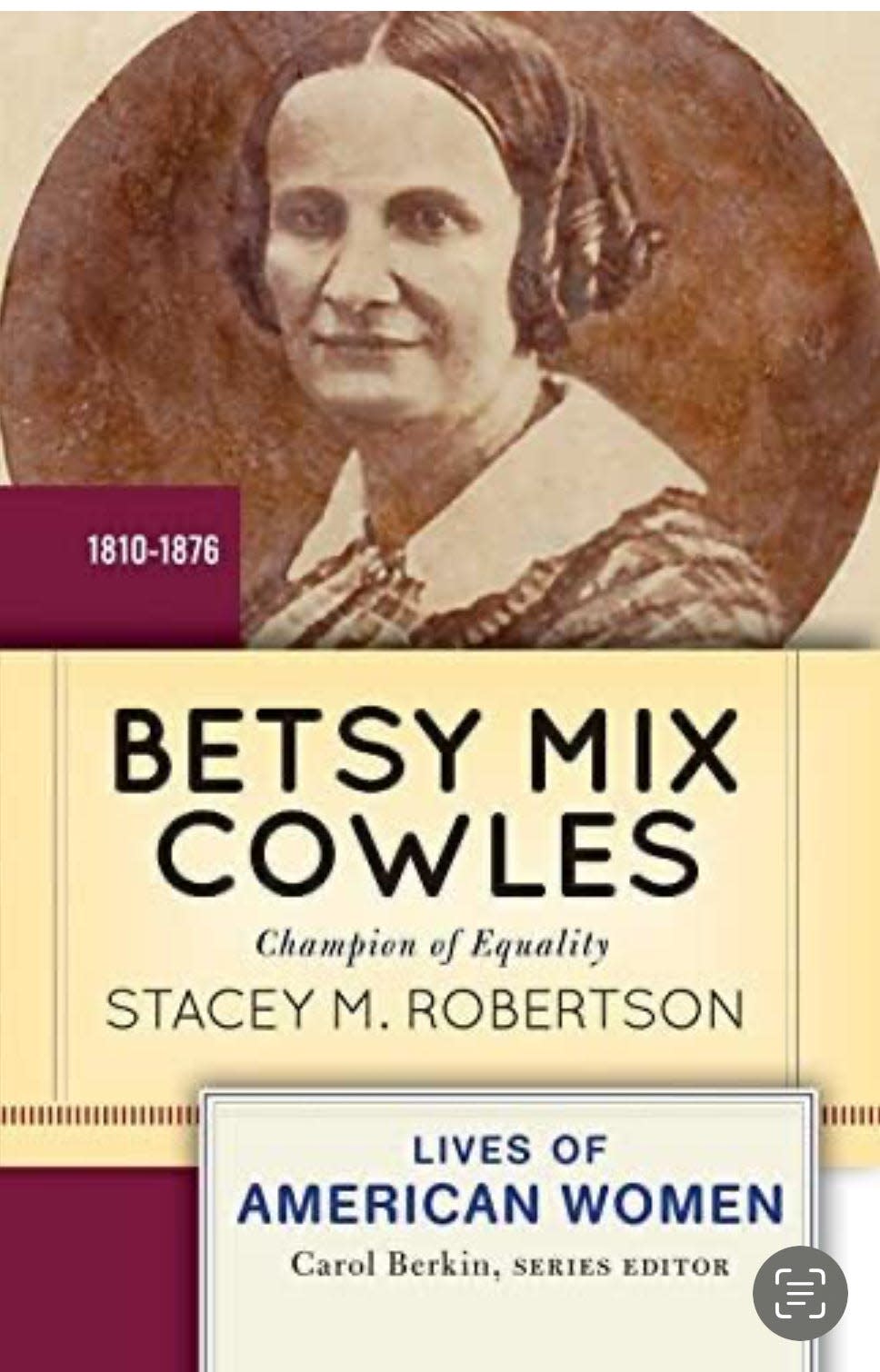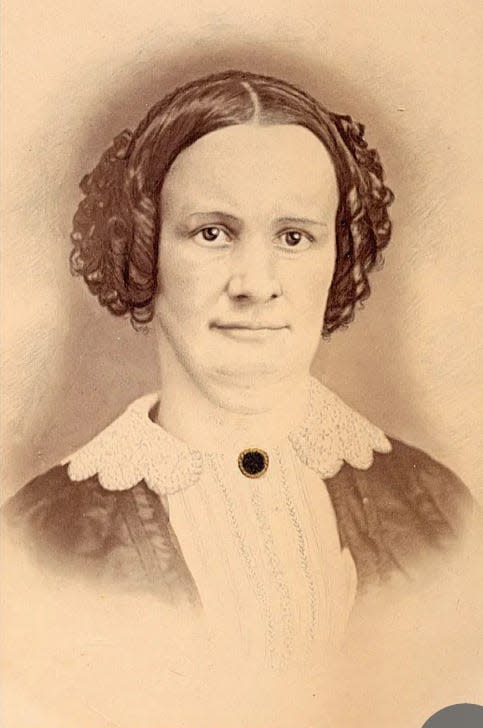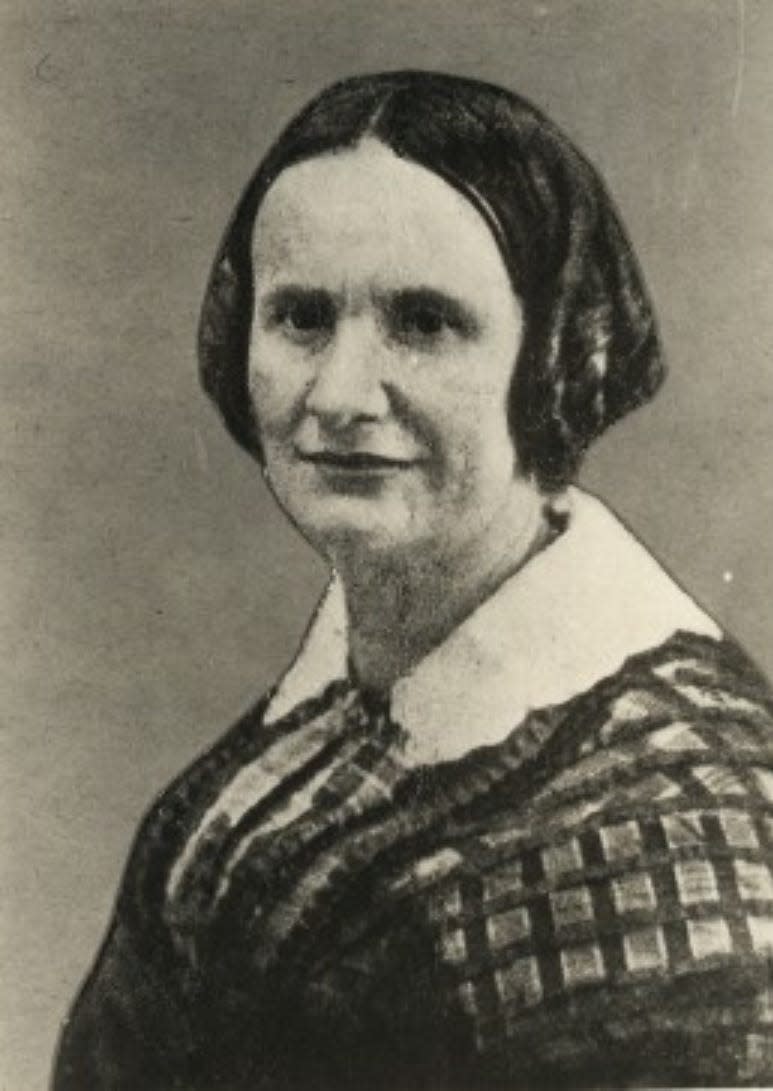Monday After: Betsy Mix Cowles had key role in Stark education

- Oops!Something went wrong.Please try again later.
- Oops!Something went wrong.Please try again later.
Abolitionist. Educator. Advocate for women's rights.
Betsy Mix Cowles was one of Stark County's strongest links to the leaders – she was one of them herself – of struggles for causes that have captured the attention of Americans for centuries.
"She was someone who, for her times, really made a mark," said Rochelle Haas of North Canton, who, with her husband, Tom Haas, and fellow researcher Tom Grove of Canton, wrote a synopsis of the life of Cowles. "She's inspiring."
Accomplishments of Cowles, as an educator in Canton and Massillon and as a leader of causes throughout the country, are uplifting to individuals who continue to struggle for racial equality, gender rights and educational opportunities for all people.
"It is hard not to marvel at the myriad of accomplishments this one woman achieved in the course of her lifetime," Haas wrote in her brief biography of Cowles, who was born in 1810 in Connecticut and died in Ohio in 1876. "She was one of the first women to graduate from Oberlin College and led a life of curiosity, learning and independence. She was a participant in every major reform movement of the antebellum period. She was a tireless proponent for abolition, education, and racial and gender equality. She refused to back down when her principles were threatened and yet still always managed to find a way to persuade, persevere, and prevail."
Despite influencing education as a teacher and administrator in both Massillon and Canton and helping to chart the course of history in the rest of the country as a leader of the abolition and suffrage movements, Cowles remains relatively unknown in Stark County to those who are not scholars or historians.
It is people who know little about Cowles that the three researchers hope to educate by looking into the life of Cowles, using her influential life to shine light on a number of other important individuals, people such as Dr. Lorenzo Whiting -- a man Cowles knew well -- who is described by Haas in her writing as "a local medical practitioner and proponent of education, women’s rights, and abolitionism."
"There were a lot of interesting people who passed through Stark County at a time when there were momentous things happening in our country," explained Haas. "They fought for their principles and freedoms. These things should not be forgotten."

Research begins with relationship
“The Toms," as Haas refers to her husband and Grove, began their research because of the commonality of causes between Whiting and Cowles, a relationship that included at its foundation Cowles' sister Cornelia and Whiting's wife Mary. Haas and Grove, both volunteer researchers at McKinley Presidential Library & Museum's Ramsayer Research Library, were fascinated by work done by Cowles, Whiting and other influential people of the Canton area.
Several years ago, the pair of researchers sought out an archive of Cowles' letters kept at Kent State University's main campus library, some of them written to Whiting about significant human rights movements in America.
"We got a chance to see the original letters, and we learned things about them and about early Canton," Grove recalled. "Many of the letters were written back and forth between Cowles and Whiting, as if they were friends."
Whiting was a doctor who would unknowingly also make history by delivering a baby named Ida Saxton, the woman who would become the nation's first lady after marrying the future president William McKinley.
And, he shared Cowles' passion for women's rights, abolition of slavery and advancement of education, Grove noted. Whiting, he said, "basically talked Betsy Mix Cowles into coming to Canton (from Massillon, where she served as a teacher and principal of the female department of the grammar school late in the 1840s)," to be superintendent of the girls grammar school and high school at the city's Union School from 1850 to 1855.
"Whiting wanted her to come to Canton to improve the educational system," said Grove, who noted her service was at a time when few women were in school administration offices.
Delving into Cowles' life
Tom Haas noted that information about Cowles is scarce, despite her enormous impact in both the county and country.
"I can't remember how we stumbled upon her. She wasn't very well known," he said. "There might have been a request for information about her."
Research began, he said, with a reading of a thin paperback book by Stacey M. Robertson entitled "Betsy Mix Cowles: Champion of Equality."
"Historian E.T. Heald has a vague reference in Volume I (of his history ‘The Stark County Story’)," noted Haas, "and we do have articles and papers in a genealogy file (at McKinley museum)."
More information about Cowles was supplied by additional newspaper articles searched in online archives and brief biographies supplied by historical websites.
"Her background coming (with her family in 1811) from Connecticut to Ohio was a fascinating trip through time," said Haas, who noted Cowles was one of the first students of the Ladies' course at Oberlin College in Ohio from 1838 to 1840, and a member of third female graduating class. "Not many women in her time attended college."
The brief bio of Cowles by Rochelle Haas hits highlights of the subject's life. She and her six siblings were raised by Sally White Cowles and Giles Hooker Cowles were brought to Ohio in a covered wagon during a month-long trip and were "raised in an environment of faith, generosity, citizenship, and community-building."
"Betsy was known for her intellect, good humor, and ability to persuade others in tactful and graceful ways. She accepted her first teaching position at the age of 17. ... Betsy had a natural affinity for teaching and became a beloved and influential mentor to both her students and fellow teachers. As Betsy became more independent, she made a conscious decision to remain single and focus on her career, travel and learning."
Cowles continued to teach in a variety of classrooms around the Western Reserve, including Massillon and Canton. Long before she came to Stark County, she was involved in the quest for racial equality and equal rights, causes that would influence her when she came to Massillon's Union School.
"At the time of Betsy’s tenure at the school, eleven black students were in attendance. However, a few white parents circulated a petition to force the children out, based upon the Black Laws," wrote Haas. "They hired an attorney and forced the school to dismiss the children, but again, Betsy fought back. She encouraged a lawsuit that challenged the constitutionality of the law and organized another antislavery fair in Massillon, raising money and awareness, which helped lead to the repeal of most of the Black Laws."

Cowles became vocal spokeswoman
In both Ohio and nationally, Cowles was a vocal spokeswoman for the causes she espoused.
"In 1835, Betsy’s Society for Intellectual Improvement organized the Ashtabula County Female Anti-Slavery Society, which went on to become one of the largest and most influential antislavery groups in the nation," wrote Haas. "Betsy assumed the leadership role and was called by abolitionist Abby Kelley Foster 'the greatest woman on the Reserve.' This was followed by the creation of the Ohio State Female Anti-Slavery Society, with Betsy again serving as a primary leader."
She spoke at conferences advocating abolition of slavery and the granting of women's rights. Such abolition leaders as Frederick Douglass and William Lloyd Garrison are reported to have visited her home.
"She was persistant and persuasive," said Haas. "She knew how to frame issues in a way that was persuasive. She could work toward her goals without getting people upset."
Her "most prestigious position" in education was as the superintendent of the Union schools of Painesville, where she served for two years.
"She continued to garner the respect and admiration of students and colleagues, and, at the age of 50, stepped down to assume a less demanding position at the Female Seminary School in Delhi, N.Y.," wrote Haas. "So illustrious was her reputation that James Saxton, prominent Canton banker, sent his daughter Ida to attend school there. It was there that Ida met her future husband and U.S. president, William McKinley, also a student of Cowles. It was said that Betsy had such rapport with the couple that William reportedly asked Betsy for her blessing before he proposed to Ida."
Death and lasting legacy
As she aged, the researchers found, Cowles developed cataracts, a condition that required several surgeries. She became blind in one eye in 1866 and lost her sister Cornelia in 1869.
"Cowles continued to persevere, despite these setbacks. It had to have been a daunting time as the nation mourned an assassinated president and Betsy herself lost her dear sister and best friend, Cornelia in 1869. Betsy kept busy traveling and participating in reform activities. ... She continued to be inspired by the energy of young women activists and served as a beacon for many."
Cowles died at 66 in 1876 after a brief illness in Austinburg, the town in which she had grown up.
It would be easy to consider Cowles' life in a solitary sense, as one woman's considerable life of accomplishment. But, the Haases and Groves – who all claim a passion for researching history – prefer to view this notable figure as merely an example of a multitude of individuals who have lived in and left an important legacy in Stark County.
Haas plans to publish her article in some form, but also envisions telling the stories of Cowles and other area notables in other forms – expanded articles, a book, podcasts or one-act plays.
"This was a woman who figured prominently in history," she said, with her husband adding, "She was an individual that the people of Stark County ought to know about."
Reach Gary at gary.brown.rep@gmail.com. On Twitter: @gbrownREP.
This article originally appeared on The Alliance Review: How Betsy Mix Cowles boosted education for Stark women

